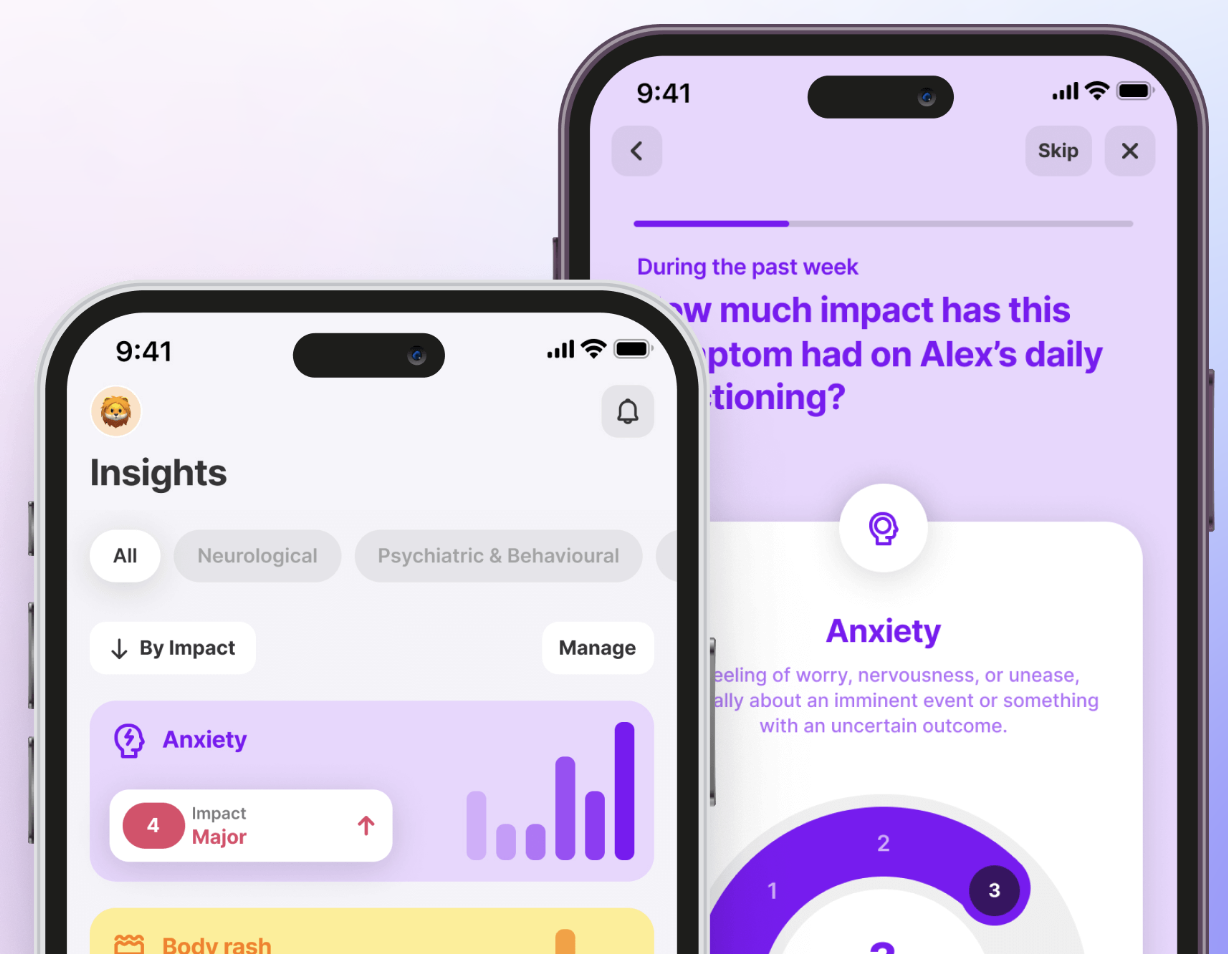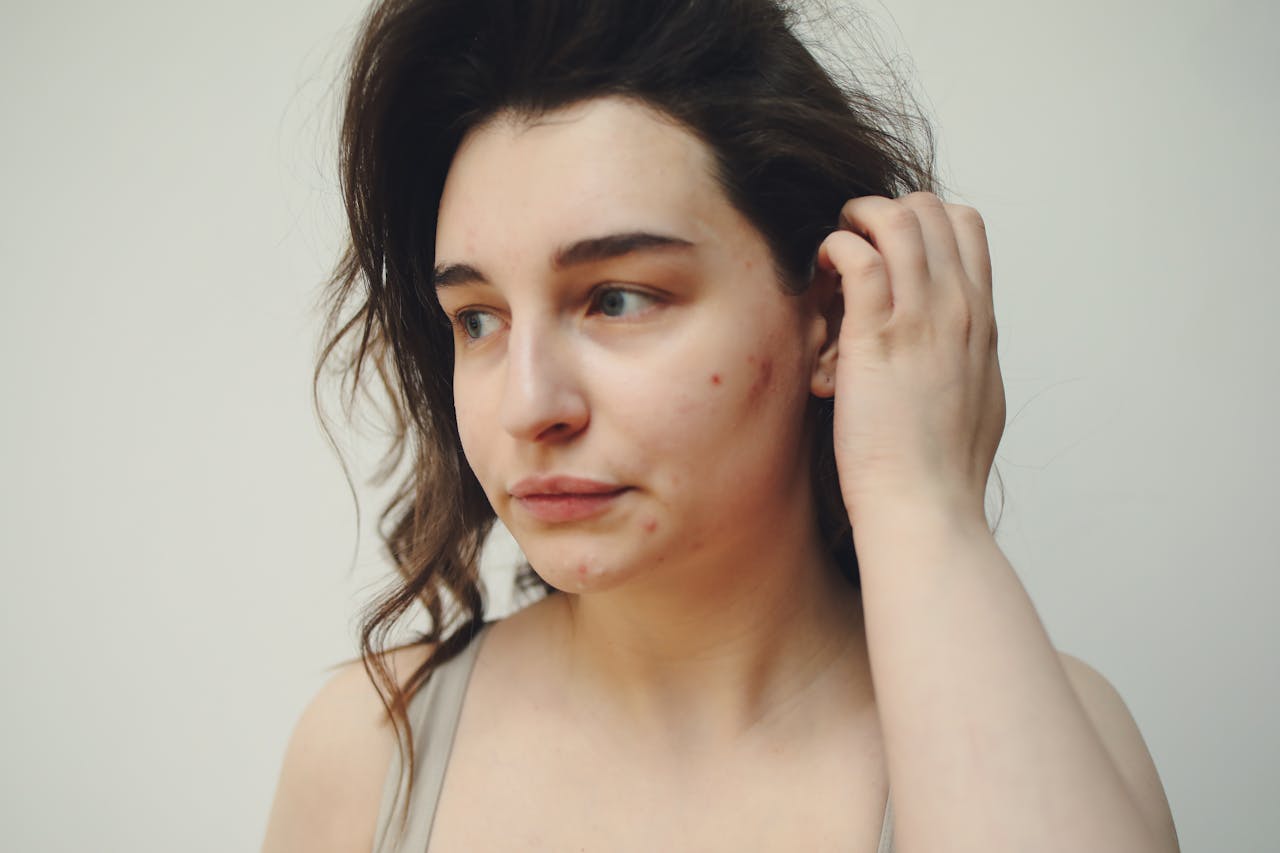POTS and Autism: Shared Symptoms, Differences & More
September 2, 2025

- POTS (postural orthostatic tachycardia syndrome) and Autism can overlap, with shared challenges like fatigue, sensory overload, and difficulty regulating daily routines.
- While symptoms may look similar, POTS is a nervous system condition and Autism is a neurodevelopmental condition. Each requires professional assessment.
- Autistic people may experience POTS symptoms more intensely due to sensory sensitivities, making tracking and self-advocacy even more important.
- Using the Human Health app, you can log symptoms, monitor treatment responses, and create clear summaries to share with your healthcare provider.
Disclaimer: Human Health is a health tracking platform and does not provide medical advice, diagnosis, or treatment. This information is for educational purposes only and should not replace consultation with a qualified healthcare professional.
Imagine standing up from a chair and suddenly feeling your heart race, your head spin, and your energy drain in an instant.
Now picture navigating those moments while also living with Autism, where sensory sensitivities and social demands can already feel overwhelming.
This is the reality for some Autistic people who also experience POTS (postural orthostatic tachycardia syndrome).
Research shows that autonomic issues like POTS are more frequently reported in Autistic individuals than in the general population. In this article, we’ll explore what’s known about this connection, highlight overlapping symptoms, and share how the Human Health app can help you track patterns and bring clearer information to your doctor.
The link between POTS and Autism
Research suggests Autistic people may be more likely to experience autonomic dysfunction, including POTS, than the general population. In one UK study, about one-third of Autistic adults assessed were diagnosed with POTS (albeit from a small sample size), and many others had related conditions. Some individuals also had overlapping hypermobility syndromes, such as Ehlers-Danlos syndrome, which may contribute to the connection.
If you’ve noticed signs of joint hypermobility alongside POTS-like symptoms, the Hypermobile Ehlers-Danlos (hEDS) Quiz can help you reflect on your experiences and better understand how hypermobility might connect to autonomic symptoms before discussing them with your healthcare provider.

Scientists are still working to understand why these conditions co-occur. Possible explanations include differences in how the nervous system regulates heart rate and blood flow, variations in sensory processing, and immune system involvement.
What’s clear is that the overlap is real enough that dizziness, fatigue, or palpitations in Autistic individuals should not be dismissed and may warrant assessment for POTS.
Shared symptoms of POTS and Autism
Although POTS and Autism are very different conditions, they can create overlapping challenges. A quick look at the symptom lists shows why they’re sometimes confused or intertwined.
Fatigue and low energy
Both POTS and Autism can involve overwhelming fatigue. In people with POTS, fatigue is among the most commonly reported symptoms (affecting ~91% of patients). For Autistic individuals, fatigue is often linked to sensory overload, social demands, or executive function strain. Together, these factors can compound, making rest and pacing essential.
Dizziness and lightheadedness
Dizziness is a hallmark of POTS, particularly upon standing, and is reported commonly in POTS patients. Autistic individuals may sometimes feel lightheaded during episodes of sensory overload or overwhelm. Although the causes differ, the result may look similar: a sudden sense of imbalance, weakness, or loss of focus that disrupts daily activities.
Difficulty with focus and memory
Many people with POTS describe feeling “brain fog,” which may happen when blood flow to the brain briefly drops after standing up. In Autism, differences in thinking and attention (like trouble remembering things or switching focus) can also make concentration harder. When the two overlap, it can be difficult to tell whether focus problems come from changes in blood flow, mental effort, or both.
Anxiety-like sensations
Both POTS and Autism can create body sensations that feel similar to anxiety, such as a racing heart, restlessness, or shakiness. In POTS, many people report these feelings, and studies suggest that anxiety-like symptoms are common, especially in younger patients. In Autism, sensory overload or unpredictable environments can heighten tension and make the body feel “on edge.” In both cases, these sensations may arise from how the body reacts, not necessarily from emotional stress or fear.
Tracking these overlapping symptoms can be especially helpful. With the Human Health app, you can log dizziness, energy levels, or sensory triggers, then tag them for context, helping you and your doctor see where symptoms overlap or diverge.

How Autistic individuals may experience POTS differently
When POTS and Autism occur together, symptoms can feel more intense and harder to manage. For example, dizziness or a racing heartbeat is already uncomfortable on its own, but for someone with sensory sensitivities, those same physical sensations may quickly become overwhelming.
Environments that others might tolerate (bright lights, crowded rooms, sudden noise) could magnify the impact of POTS symptoms for Autistic people. Recovery often takes longer, and flares may trigger shutdowns or heightened anxiety.
Practical adjustments could make a difference. Some Autistic individuals use sensory-regulating tools (such as weighted items, dim lighting, or noise-cancelling headphones) to create calmer, less stimulating environments. Tracking these sensory factors alongside physical symptoms in the Human Health app can help reveal which strategies ease the strain, providing clearer insights to share with a healthcare provider.
Available support strategies for POTS and Autism today
There’s no single approach that works for everyone, but both Autism and POTS have support strategies shown to help many people.
Autism
Support for Autistic individuals often focuses on reducing overwhelm and enhancing predictability, since unpredictable environments can become overwhelming and impair functioning. Common approaches include:
- Therapies: Speech and language therapy, occupational therapy, or behavioral approaches are used to strengthen communication, behavior, and coping skills in Autistic individuals
- Sensory supports: Dimmed lighting, quiet zones, weighted items, or noise-cancelling headphones are part of sensory integration strategies shown to reduce Autistic mannerisms and improve function.
- Structured routines: Consistent schedules that reduce uncertainty and make transitions smoother help many Autistic people by bringing predictability and reducing anxiety.
- Assistive tools and caregiver support: These can enhance independence and daily functioning; community and caregiver supports are known to improve participation and quality of life.
Research shows that outcomes improve when strategies are personalized rather than one-size-fits-all. The Human Health app can help by logging sensory triggers, tracking calming behavior strategies, and generating summaries to share with your care team.
POTS
For POTS, clinicians often recommend a mix of lifestyle adjustments, physical conditioning, and (in selected cases) medications to help regulate heart rate and circulation. Research has highlighted a few strategies that are widely used:
- Hydration and salt intake: Many patients with POTS are advised to increase fluid intake (e.g., 2–3 litres per day) and add extra salt, unless there are contraindications, to help expand blood volume.
- Compression garments: Compression stockings or abdominal binders can help reduce blood pooling in the legs and improve circulation in POTS.
- Exercise: A 2025 systematic review found that structured exercise programs improved heart rate regulation and quality of life for people with POTS, making it one of the most supported non-drug approaches.
- Medication options: Some physicians may use drugs off-label to support circulation or limit heart rate increases in POTS, though individual responses can vary widely.
Because POTS affects people differently, it’s often trial and error. Tracking whether hydration reduces dizziness, or whether certain exercises help or worsen fatigue, can give you and your provider clearer insight into what’s actually working.
Lifestyle adjustments to counter POTS & Autism
Simple daily changes can often make living with both POTS and Autism a little easier. While strategies vary by person, a few approaches are commonly helpful:
Prioritizing rest and pacing
Both POTS and Autism can bring fatigue. Planning breaks between activities and pacing physical effort helps conserve energy and avoid POTS symptom flare-ups. Using the Human Health app’s routine tracker, you can schedule rest periods and see how energy levels shift throughout the day.
Creating sensory-friendly environments
For Autistic individuals with POTS, environments that reduce sensory strain (such as dim lighting, quiet spaces, or weighted blankets) may ease recovery from dizziness or rapid heartbeat. Logging these adjustments in the app helps track which environments make symptoms less disruptive.
Staying hydrated and consistent
Hydration supports circulation in POTS, and consistency in daily routines helps reduce overwhelm in Autism. Tracking hydration habits, mealtimes, and routines together in the Human Health app can show you how structure influences your overall well-being.
Small, consistent changes often have a big impact. By combining daily adjustments with symptom tracking, you can build a clearer picture of what supports your body best.
{{inline-cta-1}}
How the Human Health app can help you manage POTS & Autism
Living with POTS and Autism can sometimes feel like navigating two different puzzles at once. One affects your body, the other your mind and senses. Put together, they can leave you second-guessing what is really going on.
This is where the Human Health app comes in. Each time you log a symptom, whether it is dizziness, fatigue, or sensory overload, you are capturing a piece of the bigger picture. Over days and weeks, those notes turn into patterns. You may notice that hydration steadies your energy, or that certain environments spark palpitations.
Instead of relying on memory, you walk into appointments with clear evidence in hand. You can show your doctor what has been happening, when it occurs, and in what context. That clarity puts you in control of the conversation and helps you advocate for the support you need.
Frequently Asked Questions:
1. Are people with Autism more likely to have autonomic issues like POTS?
Research suggests that Autistic individuals may have higher rates of autonomic difficulties, including POTS, though more large-scale studies are still needed.
2. Can POTS symptoms mimic or worsen Autistic traits?
Yes: dizziness, rapid heartbeat, and fatigue from POTS can heighten sensory overload or anxiety, making Autistic traits like withdrawal or stimming more noticeable.
3. How can I help my doctor understand what I’m going through?
Tracking your daily symptoms and routines in the Human Health app, then sharing a PDF summary, can give your doctor a clear picture and improve care conversations.
Sources:
- National Library of Medicine: Autonomic Dysfunction in Autism Spectrum Disorder
- National Library of Medicine: A Personalized Approach to Evaluating and Treating Autism Spectrum Disorder
- Frontiers in Neurology: Impact of exercise to treat postural orthostatic tachycardia syndrome: a systematic review
- ScienceDirect: Managing fatigue in postural tachycardia syndrome (PoTS): The Newcastle approach
- National Autistic Society: Autistic fatigue - a guide for autistic adults
- Neurology India: Postural Orthostatic Tachycardia Syndrome (POTS) as a Cause of Dizziness – Expanding the Etiological Spectrum
- National Autistic Society: Autism and sensory processing
- National Library of Medicine: Cognitive and Psychological Issues in Postural Tachycardia Syndrome
- National Library of Medicine: Autism Traits Predict Self-reported Executive Functioning Deficits in Everyday Life and an Aversion to Exercise
- National Library of Medicine: The Prevalence of Anxiety and Depression in Children With Postural Orthostatic Tachycardia Syndrome (POTS): A Retrospective Study
- National Library of Medicine: In Our Own Words: The Complex Sensory Experiences of Autistic Adults
- National Library of Medicine: Autism as a disorder of prediction
- BMC: Efficacy of physiotherapy with occupational and speech therapy for improving physical & behavioral status among children with autism spectrum disorder (ASD): an assessor blinded randomized clinical trial
- National Library of Medicine: Effectiveness of Sensory Integration Interventions in Children With Autism Spectrum Disorders: A Pilot Study
- National Autistic Society: Preference for order, predictability or routine
- IACC: 2022 Report to Congress on Supportive Services for Individuals with Autism
- National Library of Medicine: Management of Postural Orthostatic Tachycardia Syndrome in the Absence of Randomized Controlled Trials
- Dysautonomia International: Lifestyle Adaptations for POTS
- Cleveland Clinic: Postural Orthostatic Tachycardia Syndrome (POTS)
- ScienceDirect: The evidence for treatments for postural orthostatic tachycardia syndrome: a systematic review of randomized trials
Disclaimer: Human Health is a health tracking platform and does not provide medical advice, diagnosis, or treatment. The information on this site is intended to support, not replace, conversations with qualified healthcare professionals.
This is a div block with a Webflow interaction that will be triggered when the heading is in the view.


Start Using The Human Health App
Log symptoms and notes. Set daily reminders to check-in. Keep track of treatments you're trying. Take control of your health!








.jpg)





.png)

